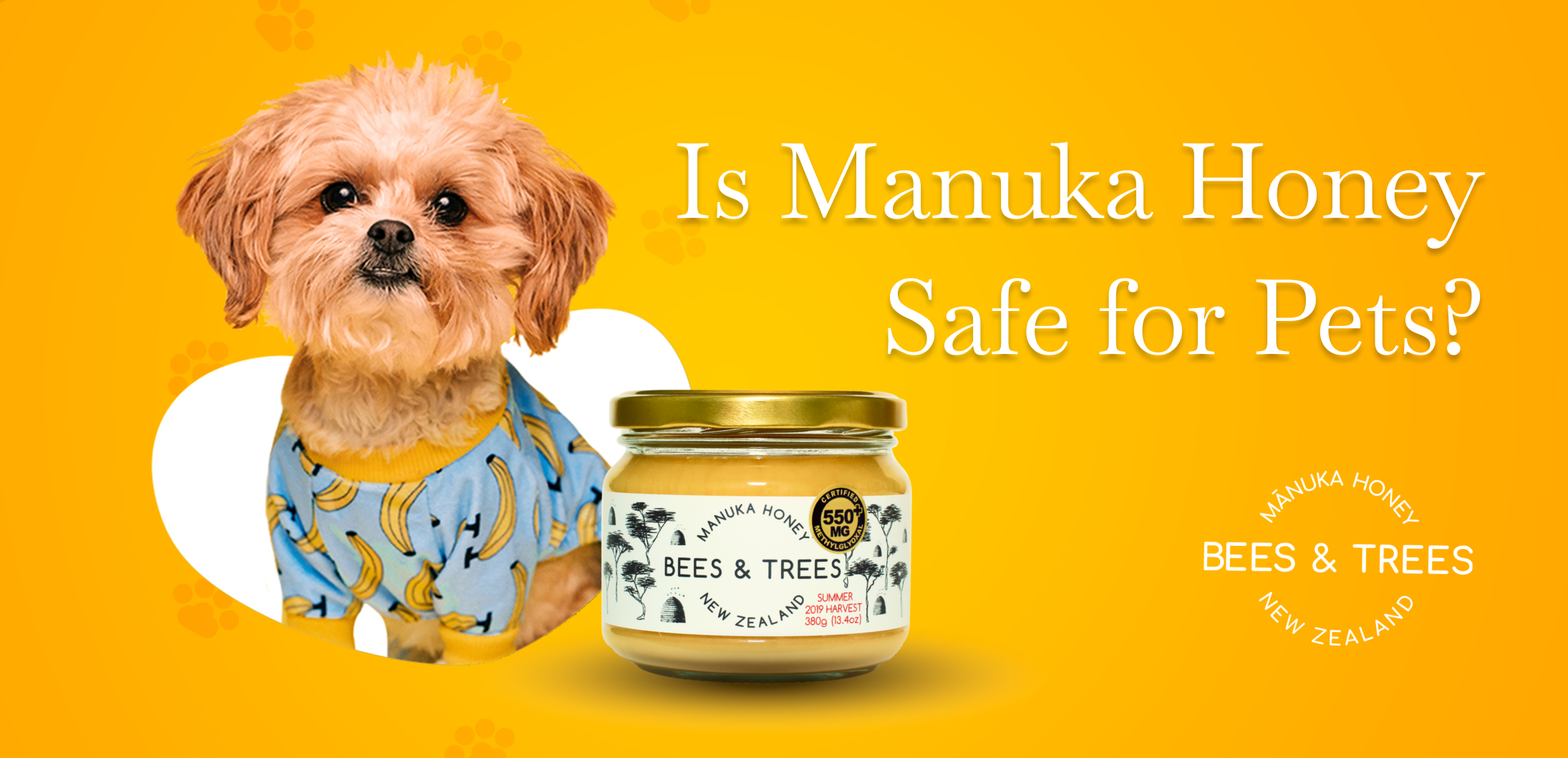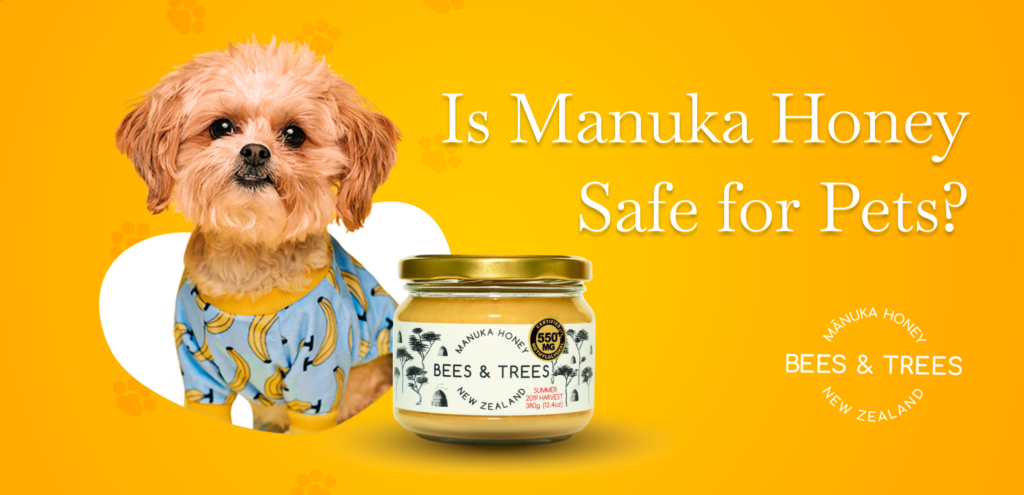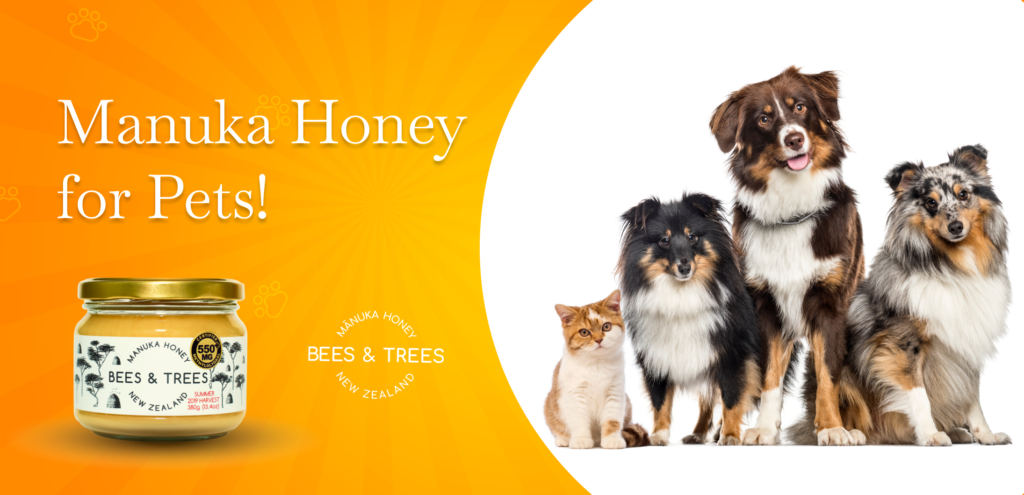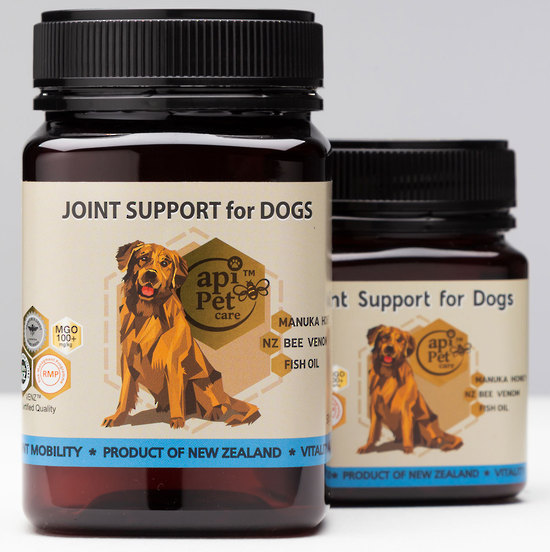
If you’re a dog owner and have been hearing about the benefits of manuka honey, you might be wondering just how much you should give to your furry friend. Luckily, we’ve got you covered. In this article, we’ll explore the recommended dosage of manuka honey for dogs and provide some tips on how to incorporate it into their diet. So, grab a cup of tea and let’s get started on finding the perfect amount of manuka honey for your beloved canine companion.

Benefits of Manuka Honey for Dogs
Manuka honey is not only beneficial for humans, but it also has numerous advantages for our furry friends, dogs. Here are some of the key benefits of incorporating manuka honey into your dog’s diet:
Antibacterial properties
Manuka honey is renowned for its potent antibacterial properties. It contains a high concentration of methylglyoxal (MGO), which gives it its antibacterial qualities. When applied topically or ingested, manuka honey can help fight off harmful bacteria that might cause infections in your dog’s body.
Promotes wound healing
Manuka honey has been found to promote wound healing in dogs. Its natural enzymes stimulate the growth of healthy tissue, making it an effective natural remedy for minor cuts, abrasions, and skin irritations. The honey’s antimicrobial properties also help prevent infection in wounds, allowing them to heal faster.
Boosts the immune system
Another notable benefit of manuka honey for dogs is its ability to boost the immune system. The honey’s unique antioxidants and phytonutrients work together to strengthen the dog’s immune response, enhancing their overall wellbeing. A stronger immune system means a better defense against illnesses, allergies, and other health issues.
Determining the Correct Dosage
While manuka honey has numerous benefits for dogs, it’s important to determine the correct dosage to ensure the best results. Here are some factors to consider when figuring out the appropriate amount of manuka honey for your furry friend:
Consulting a veterinarian
Your dog’s veterinarian is the best source of guidance when it comes to determining the correct dosage of manuka honey for your dog. They will consider your dog’s specific health condition, any medications they are taking, and other individual factors to provide personalized dosage recommendations.
Considering the dog’s weight
The weight of your dog plays a role in determining the appropriate dosage of manuka honey. Generally, a larger dog will require a higher dosage compared to a smaller dog. It’s essential to consult with your veterinarian to accurately determine the dosage based on your dog’s weight.
Assessing the dog’s health condition
The severity of your dog’s health condition should also be taken into account. If your dog is dealing with a mild issue, such as a minor cut or skin irritation, the dosage may be lower compared to more severe conditions like digestive issues or respiratory problems. Always consider your dog’s specific health condition when determining the dosage.
Recommended Dosage Guidelines
To ensure safe and effective use of manuka honey for dogs, here are some general dosage guidelines to follow. However, please keep in mind that these guidelines may vary depending on your dog’s individual needs and the advice of your veterinarian.
General guidelines
For general health maintenance, a small daily amount of manuka honey is typically recommended. Start with a low dosage, around 1/8 to 1/4 teaspoon for small dogs and gradually increase it to 1/2 to 1 teaspoon for larger dogs. This dosage can be divided into two servings per day.
Dosage for specific conditions
If your dog is experiencing specific health issues, consult your veterinarian for tailored dosage recommendations. For digestive issues such as mild stomach upset, the general dosage mentioned earlier may be sufficient. However, for more severe digestive problems, your veterinarian may suggest larger amounts, up to 1 tablespoon per day, divided into multiple servings. Similarly, for skin infections and respiratory conditions, your veterinarian will provide specific dosage instructions based on your dog’s needs.
General Guidelines for Manuka Honey Dosage
When administering manuka honey to your dog, it’s important to follow some general guidelines to ensure their safety and best response to the treatment:
Start with a small amount
To assess your dog’s tolerance and prevent any potential adverse reactions, it’s recommended to start with a small amount of manuka honey. Begin with a conservative dosage and observe your dog’s response before gradually increasing the amount.
Gradually increase the dosage
Once you have determined the initial dosage that your dog tolerates well, you can slowly increase the amount over time. This allows their body to adjust to the honey and ensures better absorption of its beneficial properties. Keep an eye on your dog’s reaction as you increase the dosage.
Monitor the dog’s response
Throughout the treatment, closely monitor your dog’s response to the manuka honey. Look for any signs of improvement in their condition, such as reduced inflammation, improved digestion, or faster wound healing. If you notice any adverse effects or no noticeable improvement, consult your veterinarian to reassess the dosage or explore alternative treatments.
Dosage for Specific Conditions
Different health conditions may require specific dosage adjustments. Here are some examples of how manuka honey dosage can vary depending on the condition being addressed:
Digestive issues
For mild digestive issues like occasional stomach upset or diarrhea, start with a small dosage of 1/4 to 1/2 teaspoon of manuka honey per day for small dogs, and 1/2 to 1 teaspoon for larger dogs. If the condition persists or worsens, consult your veterinarian for further guidance. They may recommend increasing the dosage up to 1 tablespoon per day, divided into multiple servings, for more severe cases.
Skin infections
For minor skin infections like cuts, scrapes, or minor irritations, a small amount of manuka honey applied topically on the affected area can be beneficial. Clean the wound or affected area, then apply a thin layer of honey. Repeat this process several times a day as needed until the infection resolves. If the infection is more severe or does not improve, consult your veterinarian for additional treatment options.
Respiratory conditions
In cases of respiratory conditions such as allergies or mild coughs, a daily dosage of 1/4 to 1/2 teaspoon of manuka honey can be given orally to help soothe the throat and alleviate discomfort. However, it’s crucial to consult your veterinarian to determine the underlying cause and appropriate treatment plan for respiratory conditions.
Potential Side Effects and Precautions
While manuka honey is generally safe for dogs, there are a few potential side effects and precautions to keep in mind:
Allergic reactions
Some dogs may be allergic to honey or specific components present in manuka honey. If you notice any signs of an allergic reaction, such as itching, swelling, or difficulty breathing, discontinue the use of manuka honey immediately and seek veterinary assistance.
Effects on blood sugar levels
Honey, including manuka honey, contains natural sugars, which can affect blood sugar levels. If your dog has diabetes or other health conditions that require strict control of blood sugar levels, consult your veterinarian before incorporating manuka honey into their diet.
Interactions with medications
Manuka honey may interact with certain medications, including those for diabetes, blood clotting, or immune suppression. If your dog is taking any medications, inform your veterinarian before starting manuka honey supplementation, as they can provide guidance on any potential interactions.

Tips for Administrating Manuka Honey to Dogs
To make the process of administering manuka honey to your dog easier and more efficient, consider the following tips:
Choosing high-quality manuka honey
When selecting manuka honey for your dog, ensure it is of high quality. Look for honey with a high Unique Manuka Factor (UMF) rating, as this indicates a higher concentration of beneficial properties. Additionally, opt for raw and unprocessed honey whenever possible, as it retains more of its natural enzymes and nutrients.
Mixing honey with food or water
To make it more palatable for your dog, mix the manuka honey with their regular food or water. This helps mask the taste and make it more appealing to your furry friend. Be sure to thoroughly mix the honey to ensure even distribution.
Using honey as a topical treatment
For minor skin irritations or wounds, apply manuka honey topically by gently cleaning the affected area and then applying a thin layer of the honey. Cover the area with a clean bandage if necessary. The honey will aid in the healing process and protect against infection. However, for deep wounds or severe infections, always seek veterinary advice before applying any home remedies.
Monitoring the Effects of Manuka Honey
As you incorporate manuka honey into your dog’s routine, it’s essential to monitor its effects to ensure positive outcomes and identify any potential issues. Here are some key points to consider:
Observing changes in the dog’s symptoms
Keep a close eye on your dog’s overall symptoms and condition. Note any improvements, such as reduced inflammation, improved digestive health, or faster wound healing. If you notice positive changes, this indicates that the manuka honey is having a beneficial effect on your dog.
Monitoring any adverse reactions
While rare, adverse reactions to manuka honey can occur. Observe your dog for any signs of allergic reactions, gastrointestinal upset, or other adverse effects. If you notice anything concerning, discontinue the use of manuka honey and consult your veterinarian for further guidance.
Seeking veterinary advice if needed
If you have any doubts or concerns about your dog’s response to manuka honey or their overall health condition, it’s always best to seek professional veterinary advice. Your veterinarian can provide tailored recommendations based on your dog’s specific needs and ensure their wellbeing.

Other Natural Remedies for Dogs
In addition to manuka honey, there are several other natural remedies that can benefit dogs. Here are a few examples:
Turmeric
Turmeric is known for its natural anti-inflammatory and antioxidant properties. Adding a pinch of turmeric to your dog’s food or using it as a paste can help relieve joint pain, reduce inflammation, and support their overall health.
Coconut oil
Coconut oil has various health benefits for dogs. It can help improve their skin and coat health, support their immune system, aid in digestion, and even act as a natural repellent for fleas and ticks.
Chamomile
Chamomile is a soothing herb that can benefit dogs with anxiety, restlessness, or gastrointestinal upset. Preparing a chamomile tea and allowing it to cool before giving it to your dog can help calm their nerves and aid in digestion.
Conclusion
Incorporating manuka honey into your dog’s routine can offer them numerous health benefits. From its antibacterial properties and wound healing capabilities to immune system support, manuka honey is a natural and effective remedy for dogs. By following the recommended dosage guidelines, monitoring your dog’s response, and seeking veterinary guidance when needed, you can safely and effectively utilize the power of manuka honey for your furry friend’s wellbeing. Together with other natural remedies like turmeric, coconut oil, and chamomile, you can provide your dog with holistic care that supports their overall health and happiness.
